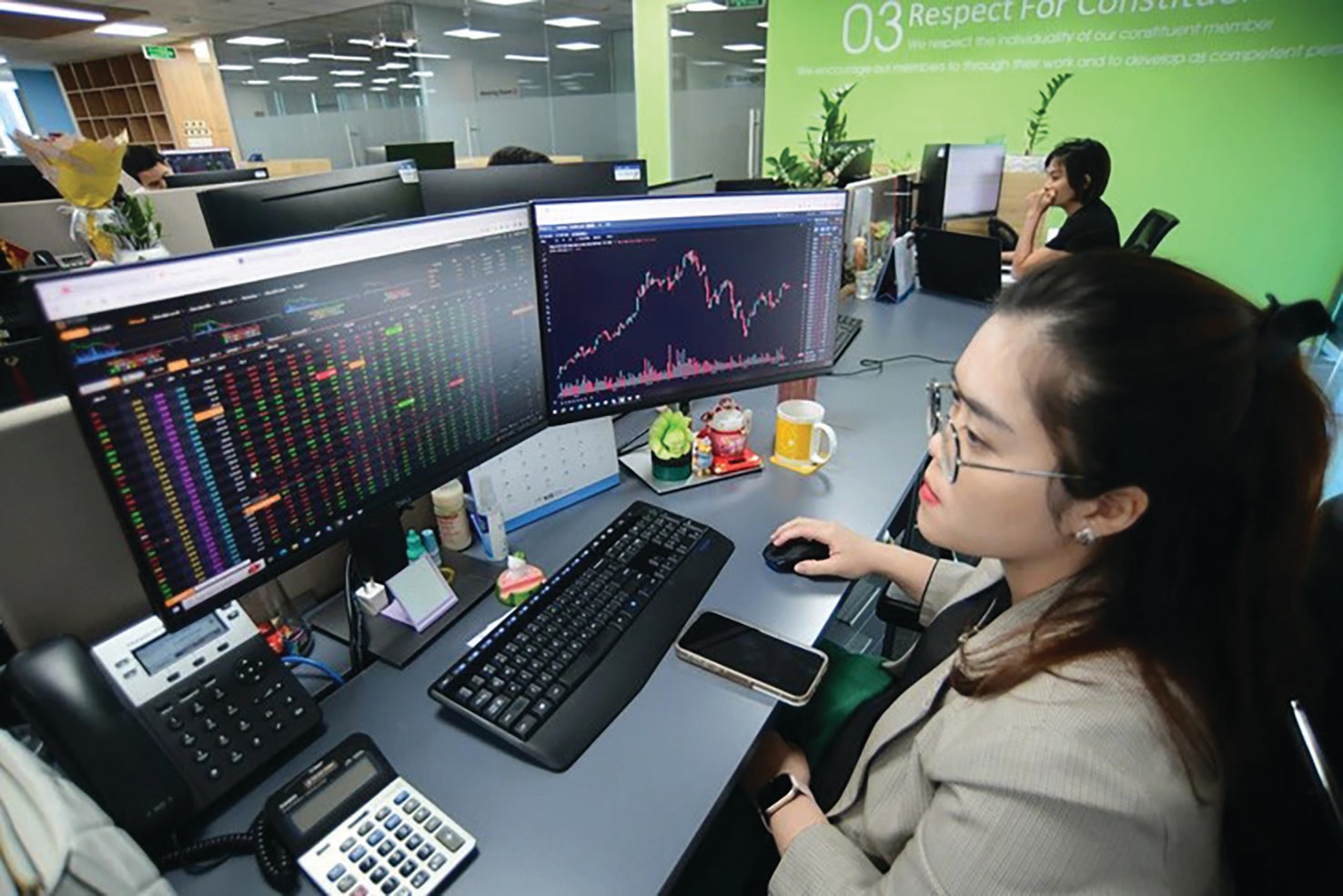Buying stocks now to wait for VN-Index to reach 1,500 Points?
Numerous appealing stocks are currently trading at cheap values as the VN-Index has been ranging between 1,200 and 1,240 points. Is it wise for investors to purchase stocks now and then sell them when the VN-Index rises to 1,450–1,500 points?

Vietnam's stock market has several key stories, such as upgrading its classification, disbursement of public investment, and implementing policies to ease difficulties in the real estate market to drive economic growth.
Many investors use the "buy low, sell high" method, which is regarded as one of the best asset trading techniques, spanning investment channels such as equities and cryptocurrency. But not all investors are able to profitably take advantage of market trends and volatility. Consequently, a lot of people use the "buy and hold" approach, particularly in markets with long-term potential.
Commenting on whether to wait to sell around 1,450–1,500 points and go "all-in" on equities when the VN-Index is at its present range, Mr. Tran Hoang Son, Market Strategy Director at VPBank Securities JSC (VPBankS), said the VN-Index is now trading between 1,200 and 1,300 points. Mr. Sơn claims that if the VN-Index falls under 1,200 points, there are usually large capital inflows that push the index and stock prices back up. "Historically, there is a good chance of profit when purchasing when the VN-Index is approximately 1,200 points. Stories about market renovations, public investment disbursements, and the ongoing implementation of regulations to address challenges in the real estate market to promote economic growth would be featured in Vietnam's stock market this year and next, he said.
Looking back, the major waves in Vietnam's stock market over the past 20 years saw the VN-Index rise sharply when fueled by significant stories. For instance, during 2005–2007, the wave of Vietnam joining the WTO attracted $2–3 billion. The 2016–2018 wave of state capital divestment drew substantial foreign inflows. The third wave, associated with cheap money, occurred during the "COVID wave" from 2020–2022. The next expected wave, tied to economic growth and market upgrades, is forecasted for 2025–2026, according to experts.
This year, the VN-Index has been consolidating around 1,200–1,300 points, with recent months showing tight candlestick formations similar to the accumulation phases of 2015–2016. Policy changes in the securities sector, such as amendments to the Securities Law, structural changes in trading cycles, and the upcoming introduction of a central counterparty clearing mechanism, are promising. "I expect the wave of market upgrading to emerging status will drive the VN-Index to new highs. Buying in the range of 1,200–1,240 points and holding medium to long-term will likely yield profits when the index reaches 1,400–1,500 points or higher," he emphasized.
Market Upgrade and Long-Term Leverage
The promotion to emerging market status is one of the main long-term drivers of the stock market. Representatives from FTSE Russell, the State Securities Commission of Vietnam (SSC), and the Vietnam Securities Depository and Clearing Corporation (VSDC) attended a Bloomberg Businessweek event on December 5 to discuss the company's progress in getting rid of the pre-funding requirement for foreign institutional investors in Vietnam.
According to Mr. Son, over the week of December 4–5, this development had a positive effect on the market, driving the VN-Index past 1,255 points to a new range of 1,270.
In FTSE's updated market classification criteria as of September 2024, Vietnam still faces challenges such as high transaction costs from failed trades. As of September, Vietnam required full securities availability before trading and 100% pre-funding. FTSE has praised Vietnam's efforts to eliminate pre-funding for foreign institutional investors starting November, but it needs further feedback from these investors over the coming months to evaluate the effectiveness and stability of the solution.
Since Vietnam had not previously used non-pre-funding schemes, there were no mistakes to assess. FTSE needs time to see if there are any problems with the new system. The FTSE is also evaluating the handling of unsuccessful non-pre-funding trades, including transaction costs and investor effect.
Securities firms will take responsibility for the settlement and sell the relevant shares on T3 if investors do not settle payments by 9:30 a.m. on T2. The FTSE is examining the process's expenses and potential effects on investors.
To bring Vietnam's securities market up to par with other countries, FTSE will work with the SSC and VSDC in the future. One of the top tasks is to implement a central counterparty clearing mechanism (CCP) in order to improve capital buffers, lower trading errors, and increase capital safety. Additional steps include updating trading and processing infrastructure with the KRX system, removing the need for consular legalization for some papers, introducing an omnibus account system, and streamlining account registration procedures.
"While these factors are not critical for FTSE's review of Vietnam's market upgrade, they will improve transaction efficiency, reduce payment risks, and make trading smoother," Mr. Son said.
Mr. Son expects updates and reports by March 2025, with an official upgrade possibly announced by September 2025. Foreign capital inflows could start 6–8 months earlier. By March, with new assessments, clearer signs of net foreign buying may emerge, Mr. Sơn concluded.
The CEO of Vietcap Securities, Mr. Nhan Tuan, said that the FTSE would continue to collect input from international institutional investors over the coming months in order to assess the efficacy and stability of the new regulation. This was mentioned in talks with FTSE Russell. Based on the base-case scenario, the upgrading is expected to take place in September 2025 during the FTSE's semi-annual review because of the approaching holidays. Updates on any advances that could shorten the period until March 2025 would be provided, according to Vietcap.








